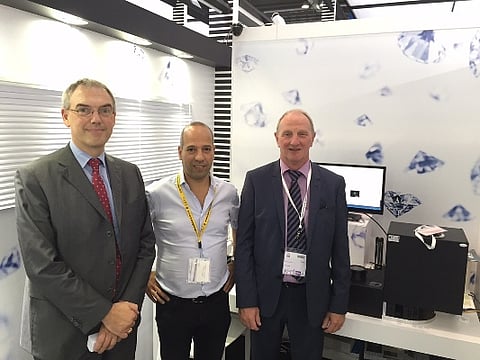

‘M-Screen’ caters to
whom?
The ‘M-Screen’ has been
designed to screen parcels of melee
diamonds within the range of 1 to
20 points. This means that most of
the ‘M-Screen’ units will be used
within environments processing a
high capacity of melee goods such
as diamond polishing factories or
diamond jewellery manufactures
and everybody in between.
Synthetic diamonds can be mixed
with natural ones in every stage of
the production process or in every
stage of the trade. Therefore, the
‘M-Screen’ is the perfect tool to
check all parcels (and not only
samples) that are supplied or
purchased.
How does its
introduction help?
With more and more companies
venturing into the production of
synthetic diamonds these days, an
influx of such diamonds entering
the market seemed inevitable. Due
to the fact the quality of laboratory grown
diamonds produced
today is of such a high quality,
differentiating natural diamonds
from their lab-grown counterparts
has become increasingly more
difficult.
All HRD Antwerp labs have the expertise and equipment to screen and detect laboratory grown diamonds but the financial cost of these examinations often outweighs the value of small, melee size diamonds. The development of an automatic melee screening device therefore deemed necessary in order to help both diamond traders as well as jewellery manufactures to enhance consumer confidence.
To that aim WTOCD, the Antwerp research centre for diamonds has developed the ‘M-Screen’ which is commercialized by HRD Antwerp.
What role will it
play?
The significant economic growth
in India and other emerging
countries has exponentially
increased overall consumer
purchasing power, which directly
fuelled the domestic diamond and
diamond jewellery market. As a
result, jewellery manufacturers
were to process large batches of
small diamonds at once which, until
now, were difficult to screen for
lab-grown diamonds, potentially
treated diamonds or simulants.
The ‘M-Screen’ provides a superfast screening solution, enabling traders and manufactures alike to screen large melee parcels. This will undoubtedly enhance trust throughout the diamond world.
What is the strategy
adopted ?
The launch of the ‘M-Screen’ took
place at the Hong Kong Jewellery
& Gem Show on September 17. It
was followed by demonstrations of
the ‘M-Screen’ at the Symposium
in the Bharat Diamond Bourse in
Mumbai, India on December 15
and 16, 2015. In January 2016, we
introduced the screening device
at the IJT-fair, Tokyo, Japan. In
the coming months our dedicated
equipment sales team will
organise public demonstrations for
interested parties, so they are able
to experience the extraordinary
features of the ‘M-Screen’ firsthand,
at the Hong Kong March
show and the Shenzhen-show in
April 2016.
Is it the best
solution to
detect lab-grown
diamonds?
Absolutely, since all stones, i.e.
complete parcels are screened
instead of only sampling them at
a super speed of 2/3 stones per
second. Other screening devices
often screen only samples.
Screening samples offer no “full
guarantee”. One cannot exclude
that there still may be lab-grown
stones in the parcels. It takes
only one lab-grown diamond in
the parcel or the jewel to harm
(damage) the reputation of the
supplier.
What is the cost ?
The selling price is € 78.000, installation and training and one
year free update of software and
minor hardware are included.
The high standards set by the
‘M-Screen’ make it the optimal
screening device for the years to
come. R &D is a continuous process
yielding optimisation on the current
technology mainly in terms of
broader specifications. Therefore
it is foreseen in the design of the
instrument that other features can
be added, or existing features can
be upgraded. That means that HRD
Antwerp can update the machine,
so that the customer is not forced to
buy a new one. This policy covers
the concern of many potential
clients.
How efficient is it?
Because of its high screening
speed, ALL stones can be screened.
The screened diamonds end –up
in 3 different bins: PASS – REFER
and SIMULANTS . The ones in
the Pass bin will be 100 per cent
natural diamonds. The ones in
the refer-bin have to be checked
by other screening and detection
instruments using different
technologies.
The ‘M-Screen’, screens at a speed of minimum 3 stones per second. It can handle a parcel of 500 cts in one go; if this parcel contains only 0.01 cts, or 50000 stones, the screening is done in less than 5 hours.
By when will the
machine be installed
in the market for the
trade to use?
The first machines will be
delivered mid-February to the first
Antwerp customers. A few weeks
later we will deliver the ‘M-Screen’s
ordered by our Indian and Hong
Kong customers. Worldwide
installation will be executed in
April- May 2016.
Will HRD Antwerp
also provide
M-Screen testing
services in their
other centres?
In addition to the commercialisation
of the ‘M-Screen’,
HRD Antwerp started with a
screening service in its Diamond
Lab in Antwerp, December 1, 2015.
The plan is to have testing centre in
Hong Kong, April 1, 2016 followed
by Mumbai, Surat and Shenzhen.
Follow DiamondWorld on Instagram: @diamondworldnet
Follow DiamondWorld on Twitter: @diamondworldnet
Follow DiamondWorld on Facebook: @diamondworldnet
